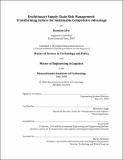Evolutionary supply chain risk management : transforming culture for sustainable competitive advantage
Author(s)
Lévy, Romain (Romain Georges Jean)
DownloadFull printable version (3.925Mb)
Other Contributors
Massachusetts Institute of Technology. Engineering Systems Division.
Advisor
Mahender Singh.
Terms of use
Metadata
Show full item recordAbstract
In today's fast-paced and turbulent global economy, the topic of risk management has gained significant interest in the business and academic world. However, in practice, risk management remains rather underdeveloped and often dealt with in an informal and reactive manner. To this end, we propose a comprehensive approach to supply chain risk management based on academic and business research and apply it to a company to develop a case study. We survey the state-of-the-art of supply chain risk management by exploring both the qualitative and quantitative sides of risk management in this thesis. We study in detail the reasons why risk is often neglected in organizations, and learn from several conceptual frameworks that have been proposed in the literature. On the more quantitative side, we explore tools that have been used or could be used for supply chain risk management, such as Decision Analysis or Real Options. We apply our proposed supply chain risk management framework to the case company, focusing primarily on qualitative methods. Data for the analysis is collected by way of semistructured interviews with business executives and relevant company documents. The results are presented to shed light on the current risk management practices at the company by highlighting their strengths and potential weaknesses. The research also draws from fields outside the normal realm of supply chain risk management. A policy perspective is taken to isolate important drivers of risk that lie beyond the direct control of organizations, such as political uncertainty and regulations. The objective is to promote a more proactive outlook in organizations to anticipate and exploit the uncertainty in the business environment. Similarly, a market perspective is used to articulate a novel way to uncover information asymmetry in the domain of risk management. Instead of simply pointing to asymmetry as an undesirable fact of business world, we propose two approaches that could be used for developing creative solutions, specifically, prediction markets and credit derivatives concepts. In conclusion, we argue that evolutionary risk management processes accompanied by a radical shift in business risk culture are required to achieve competitive advantage through supply chain risk management.
Description
Thesis (S.M. in Technology and Policy)--Massachusetts Institute of Technology, Engineering Systems Division, Technology and Policy Program; and, (M. Eng. in Logistics)--Massachusetts Institute of Technology, Engineering Systems Division, 2008. This electronic version was submitted by the student author. The certified thesis is available in the Institute Archives and Special Collections. Includes bibliographical references (p. 92-94).
Date issued
2008Department
Massachusetts Institute of Technology. Engineering Systems Division; Technology and Policy ProgramPublisher
Massachusetts Institute of Technology
Keywords
Technology and Policy Program., Engineering Systems Division.